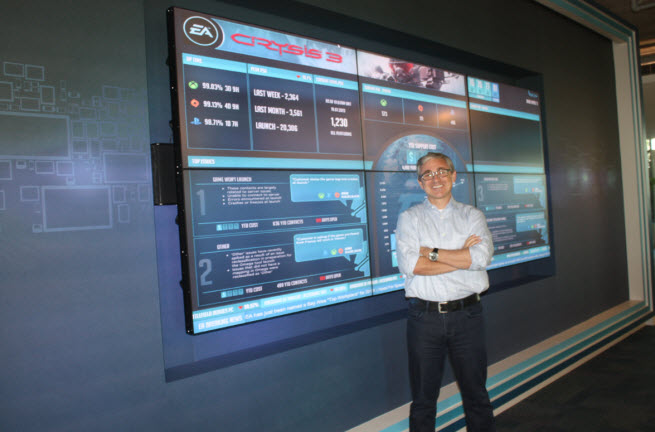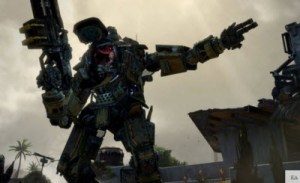GamesBeat: Many surprising leadership changes in the industry have happened recently, like Microsoft’s Xbox boss Don Mattrick going to Zynga or Julie Larson-Green now running Xbox. CEO John Riccitiello left here. You’ve stayed put. Why do you stay at EA?
Gibeau: I love making games. I love this company. This company has felt different every year. For as long as I’ve been here, and it hasn’t felt that long, it’s been a different job every year. We continue to grow the company in unique ways. We’ve faced big challenges and come through them. We’ve been growing the company aggressively, building some of the best games we’ve ever made as a company in the last 30 years. For me, I can’t think of a better place to be inside the gaming space than EA. We have so much opportunity. We have the best talent in the industry. We have the best intellectual property. When you can check those boxes — and you get to play on any platform, in any market worldwide — why would you leave?
GamesBeat: So you’re a games guy. You’re as hardcore a games person as there is in this role.
Gibeau: I play everything. I started as a tester.
GamesBeat: What do you think when the nongaming executives or managers come in charge of some of these games businesses?
Gibeau: Imagine someone trying to run a movie studio who doesn’t like movies. It doesn’t really compute. So, I’ve always felt that you have to have an insight about gamers and games and interactive entertainment. That’s how I’ve always managed. I always managed passionately, with the product and the gamer first. If you can get those things right, everything else falls into place. That’s where I think you have the most successful teams and the most successful leadership. You have to have a deep and abiding respect for the gamer — even though they’re very demanding and very vocal – and at the same time you have to be able to attract, lead, inspire, and create great games. It’s hard, but you have to have it.
GamesBeat: What was it like seeing the whole Respawn thing come about from the inside?
Gibeau: It was a unique opportunity. It’s been awesome. When they pitched us on what Titanfall was going to be, you could see the passion and the insight and where they were going with it. Watching something from Powerpoint or design doc to the reception at E3, that’s what makes this business so special. Those guys approach game development differently than some of our teams at EA. Being able to work with diverse cultures is very cool.
They had a very clear sense of what they wanted to build from day one. They haven’t deviated in any significant ways. They did not bounce around. They had a vision and a clear purpose. Every time I see the game, it gets better and better. From that standpoint, it’s been awesome.
GamesBeat: It’s different in that the single-player component seems to have less emphasis overall. Was it an easy pitch to approve, even though it seemed so different?
Gibeau: I think that’s what people are rewarding, because it is so different. It’s easy to be derivative in this business. Trying to find what is truly unique and different and being able to foster and support it is the trick. That’s where you get the breakthroughs. These guys were charismatic, passionate, and clear about what they wanted to do. That engendered a lot of confidence. We believed they were going to break new ground and try some different things. We felt it was going to be the perfect messaging to come out with in the next generation. It fit inside our overall portfolio in a great way. By all accounts, different is better. Different is what we were looking for.
GamesBeat: It turns out that August is just jam-packed with a bunch of big releases. Ubisoft has two of them. Saints Row IV is coming out. It seems like everyone’s in a rush to get their last title out before the next generation of consoles hit. Is that what would explain why all of a sudden August is such a big month?
Gibeau: I can’t speak for those guys. I can speak for us. The last generation’s hardware is going to be here for a while. PlayStation 2 had a very nice run deep into the PlayStation 3’s life cycle. I’m in no hurry to get everything out because of some idea that we’re going to turn into a pumpkin come Christmas. These are going to be great platforms with a very long tail. We’ll continue to build our franchises for gen three. We don’t have any big releases other than our traditional annualized sports games in August. But Battlefield, Need for Speed, and future versions of these other big franchises will be on gen three.
GamesBeat: I think everyone’s also staying out of the blast radius of Grand Theft Auto V.
Gibeau: [Laughs] Yeah, that’s a bad one. Great game, but one of the big things that’s in play right now in the market is that gamers are looking at gen-three titles and trying to figure out which platform they’re going to buy. Xbox One or PlayStation 4, should they wait for those? That impacts other companies and franchises.
What we’ve done — and there’s going to be a series of announcements about this over the next few weeks — as far as your persistence as a player of FIFA, for example, however far you go and whatever content you unlock, what you do on gen three will show up on gen four. Because of our technology and our game services framework, we’ll know — based on your login credentials if you opt in — that you’ve played on the PlayStation 3, and when you get your PlayStation 4, you want all the content from your EA games to be there.
We’re looking at trying to make that transition as painless as possible for gamers so that they can continue to have a blast playing Madden but also be in a position that, whatever platform they choose, they don’t have to start over. That’s one of the beauties of running these things like a service. We can have continuity through versions and platforms because we have the relationship with you. It’s not a relationship between you and a disc.
GamesBeat: I’ve been waiting to hear why these consoles are more than consoles, that these systems can provide some digital solutions for people that make it easier to move from the old games, where they leveled up on very high, to the new ones. I don’t think I’ve heard enough of that from the console guys just yet. You can incorporate a lot of cool things into these machines through Xbox Live and PlayStation Network.
Gibeau: Right. That was a big deal for us early on, as we were thinking about how we were architecting our cloud components and the client-server relationships. All the work we’ve been doing building an infrastructure with ID and commerce and the boring plumbing components of the backend, that now enables scenarios for gamers. “All my cards come over? Great!”
GamesBeat: I was curious what you thought about that very geeky Microsoft cloud processing technology, where 300,000 servers in the cloud can do the AI processing for something like Forza. It sounds like, if possible, a whole new avenue for computing itself. It also brings back memories of Larry Ellison’s network computer or whatever. [Laughter].
Gibeau: Yeah. I’m not gonna comment on that. But the cloud architecture that they’ve talked about is something that we’re researching and looking at how we might implement it in our games. The idea that we could offload different aspects of the game to be processed elsewhere at scale is a powerful idea and it could unlock new experiences. You would completely re-architect much of the game as a result. We’re excited about it. We’re doing research as we speak. We’re looking at ways to productize it in our games.
VentureBeat's mission is to be a digital town square for technical decision-makers to gain knowledge about transformative enterprise technology and transact. Learn More



